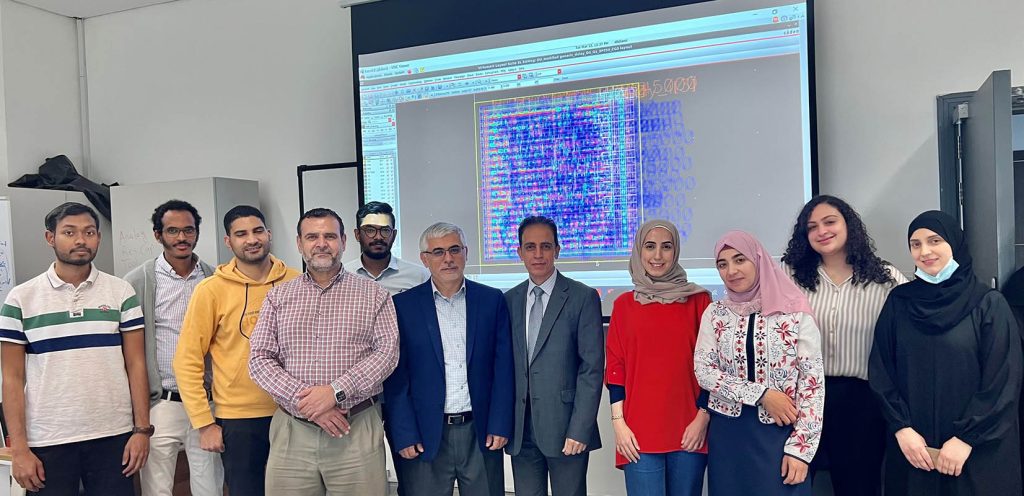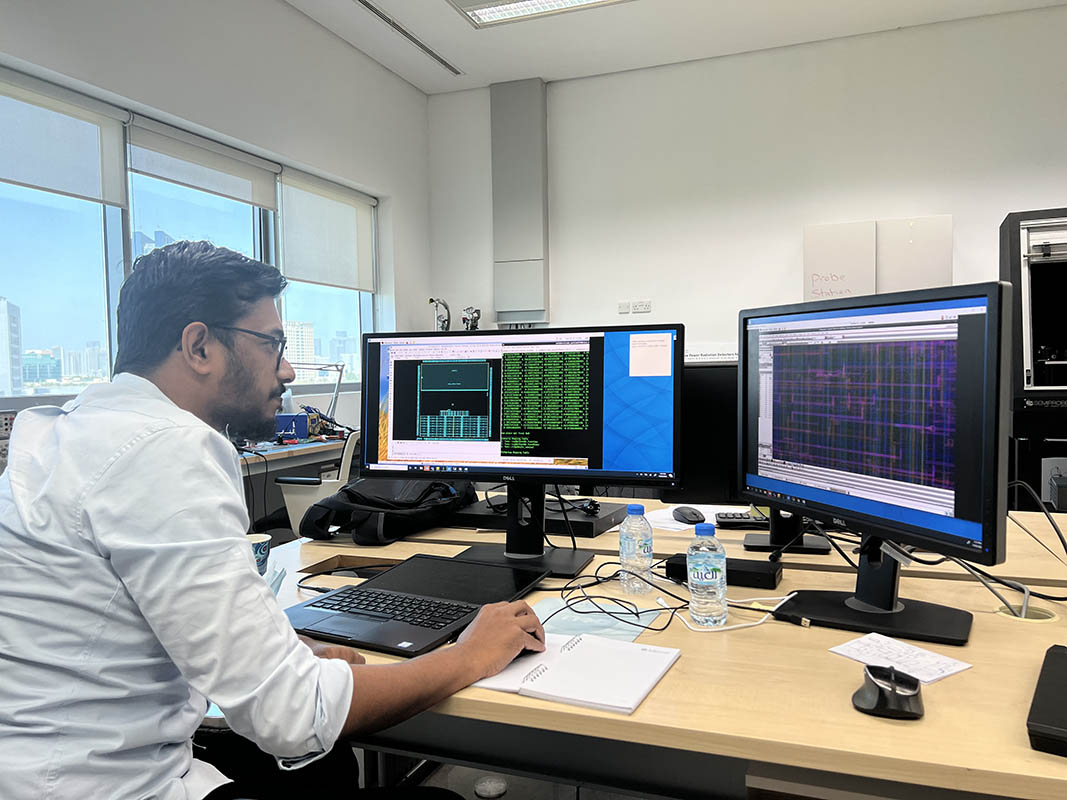Pushing the limits of chip design
Khalifa University is building the foundation for a smarter, more secure and more connected world, one silicon chip at a time.
In the rapidly evolving world of artificial intelligence and smart devices, the System-on-Chip Lab (SoCL) at Khalifa University is emerging as a regional hub of innovation. Led by Baker Mohammad, a professor of Computer and Information Engineering and a veteran with 15 years of experience at tech giants Intel and Qualcomm, the lab is uniquely positioned to bridge the gap between fundamental research and market-ready solutions.
“We’re the only facility in the region with comprehensive expertise across the full electronics design stack, from devices to circuits to systems,” Mohammad explains. This distinctive capability allows the lab to address critical challenges in energy-efficient, high-performance edge devices for data-intensive AI applications, while also integrating hardware security to protect sensitive user data.
Mimicking the brain
Nada Maher AbuHamra is a second-year PhD student supervised by Mohammad. Her work focuses on a revolutionary approach to computing that could transform the landscape of AI: neuromorphic computing.
“Neuromorphic computing is modelled after the human brain,” AbuHamra explains. “My research focuses on developing neuromorphic circuits that are fast and energy efficient. This requires integrating emerging technologies such as memristors, a fascinating new type of electronic component.”
“We’re the only facility in the region with comprehensive expertise across the full electronics design stack, from devices to circuits to systems.”
Baker Mohammad
Unlike traditional resistors, memristors can remember the amount of current that has flowed through them in the past, allowing them to act similarly to synapses in the brain.
AbuHamra’s work builds on her master’s research, which explored memristors for various sensing applications, including humidity, bio and pressure sensing. Now her aim is to push the boundaries of neuromorphic circuits, potentially leading to AI systems that are truly brain-like.
Powering the future
Muhammad Umair Khan, a postdoctoral researcher at SoCL, is tackling another crucial aspect of next-generation electronics: power management and energy harvesting. His research focuses on integrating self-powered sensors into neuromorphic systems, a challenge that requires expertise across multiple disciplines.
“We’re working on integrating self-powered sensors, such as piezoelectric, pyroelectric and thermoelectric devices, into neuromorphic systems for smart power management,” Khan explains. “We’re also developing new energy harvesting materials for applications including battery charging and wearables.”
“A major challenge in the chip industry is ensuring trust when designs are manufactured externally.”
Enas Emad Abulibdeh
This innovative approach could lead to the development of electronic devices that are not only more intelligent but also self-sustaining. Khan’s work spans materials science, device physics, and systems engineering; showcasing the lab’s multidisciplinary approach to solving complex technological challenges.

Securing electronic systems
Enas Emad Abulibdeh is leading on hardware security research in an era where data security is paramount. A PhD student, her work focuses on physically unclonable functions (PUFs), that serve as unique identifiers in a cutting-edge approach to securing electronic systems.
“A major challenge in the chip industry is ensuring trust when designs are manufactured externally,” Abulibdeh explains. “Our solution leverages PUFs, which are like unique fingerprints for chips. These PUFs extract identifiers from tiny, random variations in the silicon that occur during manufacturing, allowing us to authenticate authorized chips and detect any that might have been tampered with.”
“Memory-centric chip design aims to bring computation closer to where data is stored, reducing the time and energy spent on data movement.”
Mariam Al Zaabi
Abulibdeh’s research has already yielded impressive results. Using variations in commonly available dynamic random access memory, or DRAM, for fast, stable security key generation, the team has also implemented digital PUF variants on various chip types, demonstrating the versatility of their security solution. The team unveiled a PUF technology implemented on a manufactured chip at UMEX 2024, an international conference for unmanned systems. The high-profile industry event showcased the real-world applicability of the research and its potential impact on secure systems for unmanned technologies.
Decoding life’s blueprint
Another exciting frontier being explored at SoCL is the application of advanced chip-design techniques to genomics. Mariam Al Zaabi, a PhD student with a background in electrical and computer engineering, is pioneering research at the intersection of chip design and genome analysis.
“Genome analysis deals with a massive amount of data,” Al Zaabi explains. “Any improvement to increase the speed of the analysis would help to achieve some of the important goals of this field, such as understanding genetic variations, predicting the presence of microbes in a sample, developing personalized medicine and food profiling.”
“World-class resources, infrastructure and a talented team position the lab to make significant contributions to global industries ranging from mobile devices, automotive systems and consumer electronics to medical devices and space technology.”
Baker Mohammad
Al Zaabi’s interest in this area was sparked during her first semester as a PhD student. She took a course on memory-centric computing, which focuses on optimizing data movement between memory and processors at the chip level and is crucial for handling the enormous datasets involved in genomic research. “Memory-centric chip design aims to bring computation closer to where data is stored, reducing the time and energy spent on data movement,” Al Zaabi elaborates.
From lab to sky
The lab’s research also has practical applications. “We’ve partnered with the Technology Innovation Institute [in Abu Dhabi] to develop a secure unmanned aerial vehicle platform for applications such as rescue and delivery,” Mohammad says, adding that the project showcases the lab’s ability to translate cutting-edge research into real-world solutions.
“We delivered the first version of a custom flight controller and AI chip fabricated on 22-nanometer process, and are now working on the second version,” Mohammad says. This mainstream chip design leverages global collaborations, demonstrating the lab’s international reach and impact.
A global impact
Looking ahead, SoCL aims to become a world-leading center advancing AI through efficient, secure hardware for edge devices. “The United Arab Emirates’ bridging position between East and West, combined with exceptional research support, makes Khalifa University ideal for this mission,” Mohammad explains. “World-class resources, infrastructure and a talented team position the lab to make significant contributions to global industries ranging from mobile devices, automotive systems and consumer electronics to medical devices and space technology.”




